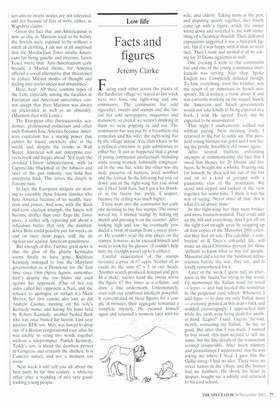Facts and figures
Jeremy Clarke
Facing each other across the piazza of the Sardinian village we stayed in last week were two bars, one right-wing and one communist. The communist bar sold cigarettes, sweets and stamps and the fascist bar sold newspapers, magazines and stationery, so even if we weren't drinking in them we were popping in and out. The communist bar was run by a breathless old comedian and his wife; the right-wing bar by the village mayor. You didn't have to be a political extremist to gain admittance to either bar. It just so happened that a group of young communist intellectuals, including some young women, habitually congregated in the one bar, while the other was the male preserve of hunters, local worthies and the retired. In the left-wing bar you sat down and in the right-wing bar you stood up. I liked both bars, but I got a lot drunker in the fascist bar, partly, I suspect, because the ceiling was much higher.
I first went into the communist bar early one morning to buy five stamps. The owner served me. I mimed 'stamp' by licking my thumb and pressing it on the counter. After looking high and low, he eventually produced a hook of stamps from a sweet drawer, He couldn't read the tiny prices on the stamps, however, so he excused himself and went to look for his glasses. (I couldn't help him: my eyesight wasn't up to it either.)
Careful examination of the stamps revealed a price of 67 cents. Neither of us could do the sum 67 x 5 in our heads. Another search produced notepad and pen. In a shaky, rococo hand the owner wrote the figure 67 five times as a column, and drew a line underneath. Unfortunately, even with our combined intellects powerfully concentrated on these figures for a couple of minutes, their aggregate remained a complete mystery. He excused himself again and returned a moment later with his wife, also elderly. Taking turns at the pen, and disputing quietly together, they finally came up with a figure, which the owner wrote down and revealed to me with something of a theatrical flourish. Their defeated expressions suggested it was a ball-park figure, but if I was happy with it then so were they. Then I went and spoiled it all by asking for 20 Diana cigarettes as well.
One evening I went to the communist bar and one of the young communist intellectuals was serving. Nice chap. Spoke English too. Completely deluded though. To him, everything, even the weather, was the result of an American or Israeli conspiracy. He'd written a book about it and was currently working on the sequel. Surely the American and Israeli governments would not take kindly to being exposed in a book, I said. He agreed. Every day he expected to be assassinated.
That night I inadvertently walked out without paying. Next morning, early, I returned to the bar to settle up. The paranoid young barman was gone and I was facing the gentle, breathless old owner again.
After several fruitless exhausting attempts at communicating the fact that I owed him money for 20 Dianas and five beers, he bought me a whisky. Pouring one for himself, he then led me out of the bar and on to a kind of parapet with a panoramic view of the mountains. We stood and sipped and looked at the view together for some time. I think it was his way of saying, 'Never mind all that: this is what it's all about, mate.'
In the right-wing bar they were brisker and more business-minded. They could add up the bill and everything. And I got off on the right foot straight away by snapping up all four copies of the Mussolini 2003 calendar they had on sale. The calendar, a celebration of 11 Duce's colourful life, will make an ideal Christmas present for those 'difficult to know what to buy for' people. Mussolini did a lot for the Sardinian infrastructure before the war, they say, and is fondly remembered for it.
Later in the week I spent half an afternoon in the fascist bar trying to buy wood. I'd memorised the Italian word for wood
— legno — and had located the woodman in the perpetual card school. Whenever I said legno — to date my only Italian noun
— everyone pointed at this man's back and nodded encouragingly. I approached him while the cards were being dealt for another hand. `Legno?' I said. 'Leg-ne,' he said, sternly, correcting my Italian. So far, so good. But after that I was stuck. I wanted to buy wood, this man wanted to sell me some, but the fine details of the transaction seemed insuperable. After much mimicry and gesticulation I understood that he was asking me where I lived. I gave him the Gallic shrug. I had no idea. There were no street names in the village and the houses had no numbers. He shook his head in despair, bought me a whisky and returned to his card school.


























































































 Previous page
Previous page